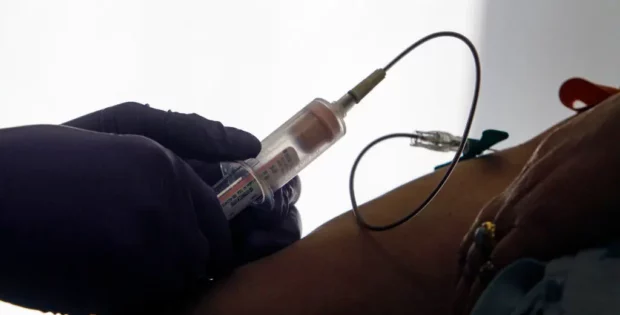More Pleasant Colon Cancer Screening? A New Blood Test Makes It Possible

50 million Americans due for colon cancer screening avoid it because they consider traditional tests so unpleasant. But now it can be as simple as a blood test.
If you’re overdue for your colon cancer screening, you’re not alone. Even though colon cancer is highly treatable when it’s found early, 1 in 3 adults eligible for screening in the United States don’t complete this critical step, often because they see the available options as unpleasant, inconvenient or uncomfortable. If you can relate, there’s a new option that might change your mind: a blood test recently approved by the U.S. Food and Drug Administration (FDA) to screen for colon cancer.
Why Early Detection Is So Important
Getting regular health screenings is crucial to find disease early, especially as you age. This is particularly true for colon cancer. If the disease is caught in its early stages, before symptoms develop, the five-year survival rate is an impressive 91%. Despite this, colorectal cancer (affecting the colon or rectum) remains the second leading cause of cancer-related deaths in the United States.
One of the main reasons: 3 out of 4 individuals who die from colon cancer are not up to date with screening. If you aren’t screened in a timely manner, colon cancer may not be found until symptoms develop, in later stages, when survival rates can plummet as low as 13%.
The Problem with the “Ick” Factor
Current guidelines recommend that individuals at average risk for colon cancer (who have no personal or family history of colon cancer or related diseases) begin screening at age 45. So, given the importance of early detection, why are millions of eligible Americans still avoiding colon cancer screening? Simply put, many people find the traditional options — colonoscopy and stool-based tests — unpleasant or inconvenient.
While the tests are accurate, some people just don’t want to deal with the special diets, colon cleanouts, discomfort, and extra time off work associated with colonoscopy or the “ick” factor of handling stool. In fact, studies show that only 28-71% of patients who are prescribed these screening methods complete them. The screening rate for colon cancer in the United States is stagnant at about 59%, which falls well below the National Colorectal Cancer Roundtable’s goal of 80% for eligible individuals.
Colon cancer screening is only effective if you complete the test. With 53,000 Americans expected to die from colon cancer in 2024, we need another option for the millions who are avoiding screening.
A More Pleasant Screening Option
The good news is that the FDA approved a new screening option earlier this year that could be more appealing for many people. With Shield™, a blood test for screening adults age 45 and older at average risk for colon cancer, the process is as simple as getting a blood draw during any healthcare visit. The convenience and the more pleasant nature of the test appear to make a difference: One study showed that more than 90% of people who were given a prescription for the test completed it.
Shield works by detecting colon cancer signals in the bloodstream from DNA shed by tumors. After a simple blood draw, your screening results — and the peace of mind of knowing your status — are available in approximately two weeks. (If the test is positive, you’ll need to have a colonoscopy to confirm whether you have cancer.)
The FDA approval of the test was based on results from the ECLIPSE study, published in The New England Journal of Medicine. One of the largest cancer screening studies of its kind, enrolling more than 20,000 people, ECLIPSE showed that Shield has 83% sensitivity, which means the test accurately identifies 83% of individuals with colorectal cancer. This performance is within range of other non-invasive screening methods recommended in current screening guidelines, in which overall sensitivity ranges from 74-92%.
Making Screening a No-Brainer
Many people today make it a priority to take care of their health — eating well, exercising, and seeing a healthcare provider for annual check-ups. But when it comes to colon cancer screening, they’re just not as proactive as they would ordinarily be — often to their own detriment.
Dennis B., a 55-year-old attorney, was diagnosed with a benign brain tumor in 2018, so his doctor ran a battery of screening tests. He mentioned screening for colon cancer to Dennis for the first time and recommended a colonoscopy. Dennis agreed to schedule it.
However, despite his best intentions, Dennis didn’t follow through with scheduling his colonoscopy. And for several years after that, he also didn’t complete the paperwork required to receive an at-home stool-based screening test.
When Dennis saw his doctor recently — still holding out on screening — his doctor told him that he now had a different screening option for him; one that could be done conveniently and required no special preparation, diet changes, sedation, or stool collection. It was the Shield blood test. Dennis was intrigued by this new option for screening and agreed to try it. Fortunately, the results came back normal.
He later commented, “Most people in my situation know we’re supposed to get screened for colon cancer, but it’s hard to find the time to schedule it if you have a busy life and a demanding job. I realized I had taken quite a risk by waiting so long to screen. This blood test is a much more pleasant way to screen, and the convenience of it makes getting screened pretty much a no-brainer.”
More Options to Improve Access
In addition to the simplicity of it, screening with a blood draw during a routine healthcare checkup can be much easier for many people who don’t have good access to healthcare facilities or transportation, or don’t have flexibility in their job schedule or paid time off. Indeed, studies show that when healthcare providers offer different screening options, it can boost the number of people getting tested, which in turn could potentially reduce colon cancer deaths because patients can get earlier treatment.
The Shield test is already covered by Medicare, so if you have Medicare Part B, you’ll have no out-of-pocket cost. If you have a Medicare Advantage plan, you may have a copay. Coverage by commercial insurance plans typically depends on the test being included in screening guidelines established by the American Cancer Society and the U.S. Preventive Services Task Force (USPSTF). Preventive healthcare services recommended by the USPSTF are covered by insurers with a $0 out-of-pocket cost for patients. (The USPSTF colon cancer screening guidelines have not been updated since 2021.) This would make the test more affordable and accessible for the millions of individuals looking for an alternative screening option.
Take Action Now to Protect Your Health
Don’t let the inconvenience or the “ick” factor of traditional colon cancer screening tests stop you from taking care of your health. Early detection can save your life, and now the Shield blood test makes screening more pleasant and more convenient than ever before.
If you’re 45 or older, at average risk, and are due for colon cancer screening, talk to your healthcare provider about what screening option makes the most sense for you, or visit ShieldCancerScreen.com for more information.


